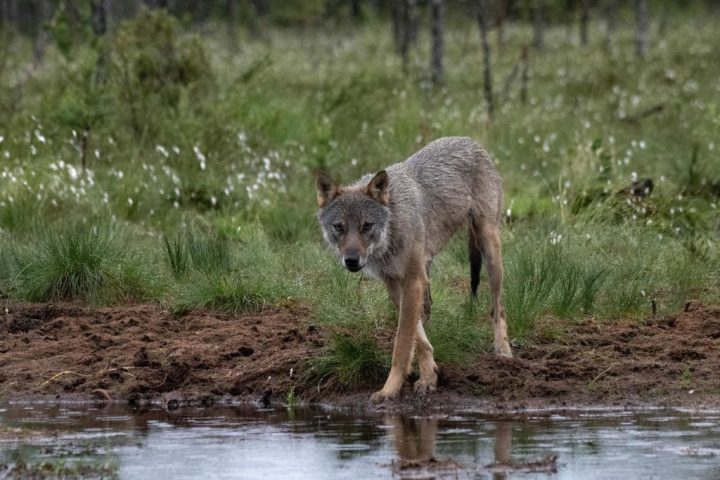Should we release packs of ravenous wolves into the English countryside? The answer is so obviously ‘of course not, are you insane?’ that I anticipated no disagreement when I scoffed at a pro-wolf Guardian article by George Monbiot last week.
Monbiot has found common cause with wolves because he hates sheep-farming and wants to ‘rewild’ Britain. His latest article uses deer as an excuse to promote the interests of the wolf lobby. There are too many of them, apparently, and the best way to deal with a surplus of deer is to have them torn apart by apex predators.
The reason wolves are the bad guys in so many fairy tales is that they loomed large in the fears of pre-modern society
Monbiot has been banging on about the benefits of wolves for twenty years. He accepts that wolves kill people from time to time, but says that depression also kills people and that ‘the excitement of knowing that they [man-eating predators] are out there somewhere’ could prevent depression and thereby save lives. One can only admire the creativity of this argument.
Monbiot’s opinion is enjoyably eccentric and I assumed that no one else shared it, but it seems like the tide is turning. For several days I have been receiving messages assuring me that wolves have been unfairly maligned in fairy tales and want nothing more than to co-exist peacefully with sheep, cats and children. They only occasionally attack people and certainly kill fewer humans than dogs/cows/cars. Their reintroduction to Yellowstone national park was a tremendous success and they are only a minor problem where they survive in several European countries. Why can’t wolves and lambs just get along?
Time and again I found myself asking ‘did a wolf write this?’. I have nothing against wolves per se. They are cool animals and, as with other cool animals (great white sharks, crocodiles, etc.), I have no desire to wipe them off the face of the earth. So long as they are kept away from farms and large populations, as they are in Yellowstone and Scandinavia, I say live and let live.
But the reason wolves are the bad guys in so many fairy tales is that they loomed large in the fears of pre-modern society – and they loomed large because they were a mortal threat to farmers and their livestock. They still are.
It is true that some breeds of dog attack people, but the answer to that is banning dangerous dogs, not bringing back wolves. It would be interesting to know how many people who are (rightly) in favour of banning the Bully XL side with Monbiot on the wolf issue. It would also be interesting to know how many people who support the ban on hunting deer with dogs are in favour of deers being ripped limb from limb by wolves.
Not that we can guarantee that wolves will stick to the script and only kill deer. In France, where wolves reappeared in the 1990s, ‘the number of livestock victims has been increasing linearly and almost constantly over the last 12 years’ as the number of wolves increases. The number of livestock deaths, mostly sheep, currently stands at around 15,000 per year. A French councillor was attacked by wolves in February and a wolf killed the pony of European Commissioner Ursula von der Leyen last September. Perhaps those medieval peasants had a point?
Insofar as deer are a problem, shooting them and eating venison strikes me as a better solution than unleashing wolves, hoping they only kill deer and then having to shoot the wolves when they predictably start killing livestock and people. The pro-wolf campaign – and the rewilding movement in general – only really makes sense if you disapprove of farming.
If you are the kind of person who doesn’t see why farmers waste their time producing food in fields when they could simply buy it from a shop, the idea of turning vast swathes of the countryside into a wilderness may hold some appeal – even though you will almost certainly never visit it. George Monbiot is probably right when he says that city dwellers enjoy an occasional frisson of excitement from thinking that wolves are on the prowl somewhere, but this seems an insufficient reason to overrule the wishes of people in villages who will have to ‘co-exist’ with them. Rural management should not be dictated by whatever makes townies feel edgy.
The last wolf in Britain was probably killed in the eighteenth century. Urbanisation in the years since has distanced the public from the realities of nature to such an extent that a creature that was once a justifiable object of terror is being reimagined as a doughty folk hero. The wolf is taking the place of the fox – a much lesser nuisance – as a symbol of what the countryside should be about to people who have never lived there, perhaps because the spread of urban foxes has made city dwellers aware that foxes are not as cute as they thought.
Since London is over-run with foxes and city dwellers like the idea of wolves, an obvious solution presents itself. Let’s release wolves into the London suburbs and drop a few breeding pairs into Hyde Park and St James’s Park where they will no doubt enrich the ‘eco-system’ so beloved on the pro-wolf lobby. We will have to cross our fingers and hope that they only hunt foxes, but if they start killing children and pets there is always plan B: release the grizzly bears.






Comments